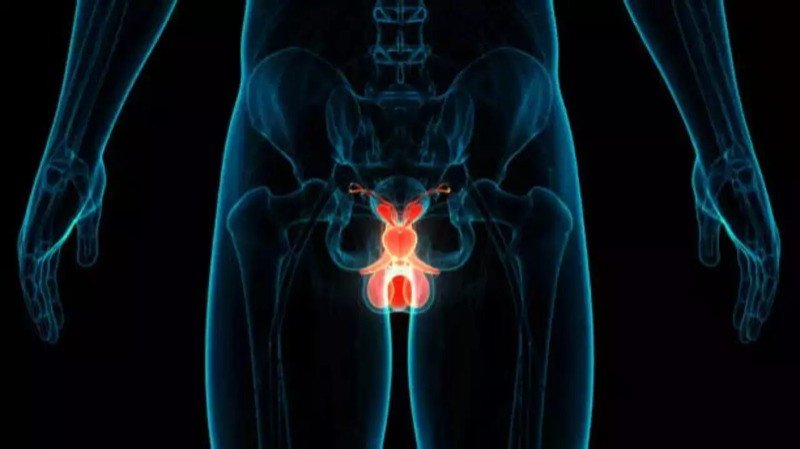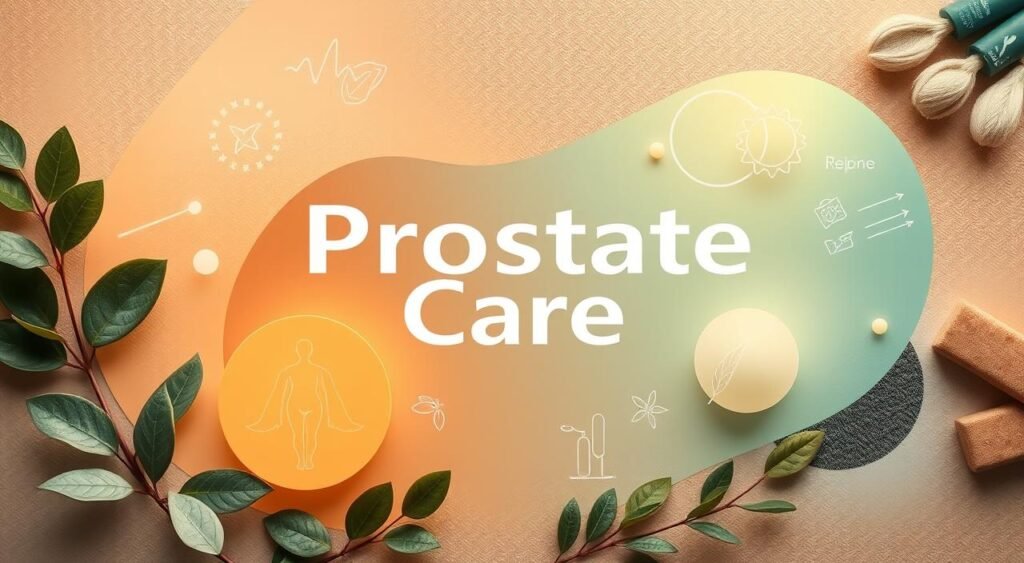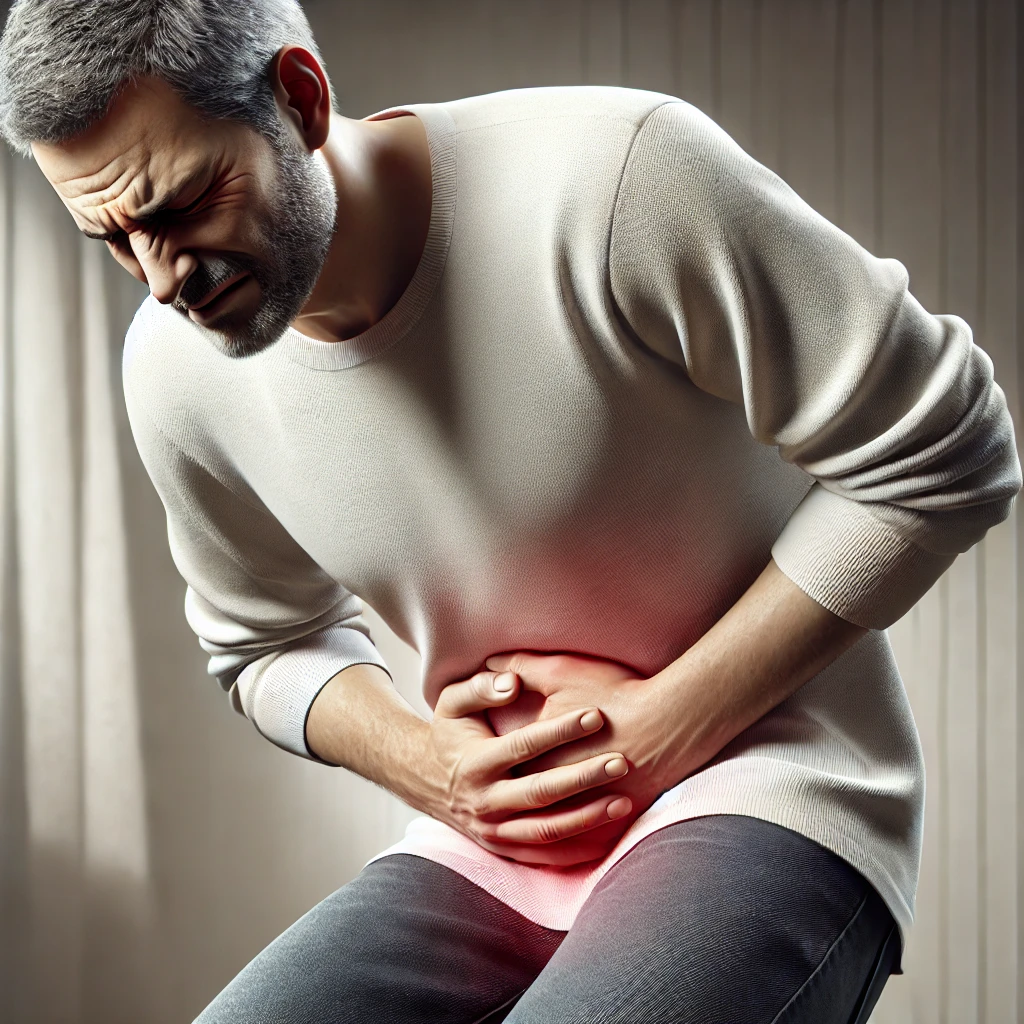Understanding prostate swelling is key to your health. It affects your quality of life, causing issues like frequent urination. These symptoms can disrupt your daily routine.
Many people face prostate swelling. Knowing the causes helps you take care of your prostate. This way, you can prevent its negative effects and keep your prostate healthy.
Prostate health is very important. Dealing with swelling is crucial. You should know about the causes of prostate swelling and how to fix them to make smart health choices.
What Is Prostate Swelling and Why It Occurs
Understanding the prostate’s role in the male body is key. It’s a small gland that helps nourish sperm. When it gets bigger, it can cause prostate symptoms like trouble urinating or needing to go more often.
Spotting these signs is important. They might mean your prostate is enlarged or there’s another issue. You might feel like you can’t empty your bladder fully or have a weak urine flow. If you notice these, see a doctor to find out why.
Understanding Your Prostate’s Function

Your prostate is crucial for male health. Knowing how it works helps you spot swelling signs early. This way, you can take steps to keep your prostate healthy.
Common Symptoms of Prostate Swelling
Here are some common signs of prostate swelling:
- Difficulty starting or stopping urination
- Frequent urination, even at night
- Weak or interrupted urine flow
- Painful or burning urination
When to Seek Medical Attention
If you’re showing any of these symptoms, get medical help. A doctor can figure out what’s wrong and suggest treatment. Catching and treating problems early can make a big difference.
Main Causes of Prostate Swelling
Understanding the main causes of prostate swelling is key to your prostate care. Identifying the root causes helps in choosing the right treatment. The main reasons include age-related changes, hormonal influences, and other medical conditions.
Age-related changes are a big factor in prostate swelling. As you get older, your prostate naturally changes, leading to swelling. Hormonal shifts, like changes in testosterone, also play a role.
Medical conditions like infections or inflammation can cause swelling too. It’s important to see a healthcare professional for a proper diagnosis and care plan. They can figure out the cause and suggest the best treatment.

- Family history of prostate issues
- Age and hormonal changes
- Medical conditions, such as diabetes or heart disease
- Lifestyle factors, including diet and physical activity
Knowing these factors helps you manage your prostate health better. Effective treatment combines medical care, lifestyle changes, and natural remedies. These can be customized to fit your specific situation.
Seeking professional healthcare advice is crucial for an accurate diagnosis and effective treatment. A doctor can determine the specific causes of prostate swelling in your case and recommend an appropriate care plan.
Age-Related Prostate Changes
As you age, your prostate changes naturally. This can affect its size and how it works. Benign Prostatic Hyperplasia (BPH) is a common issue. It’s a non-cancerous growth of the prostate gland.
BPH often causes symptoms like frequent urination, weak urine flow, and difficulty starting or stopping urination. Hormonal changes also contribute significantly; for instance, an increase in dihydrotestosterone (DHT), a hormone linked to prostate growth, is common with aging. These hormonal shifts are another significant contributor to the causes of prostate swelling as men get older.
Understanding BPH and Hormonal Factors
Recognizing the connection between BPH, hormones, and the causes of prostate swelling is vital. BPH is common in older men but not a sure thing. Your family history and lifestyle can raise your risk. Knowing this can help you stay healthy and keep your prostate in good shape.
Genetic Predisposition and Prostate Health
Genetics can also affect prostate changes with age. If your family has prostate issues, you might too. You can’t change your genes, but a healthy lifestyle and regular check-ups can help.
Infection and Inflammation Factors
Understanding infections and inflammation in the prostate is key to your health. These issues can cause pain, discomfort, and trouble urinating. Bacterial infections, like prostatitis, can swell the prostate and lead to more problems.
If you have a prostate infection, seeing a doctor quickly is important. They can diagnose it with a physical exam, medical history, and tests. Treatment might include antibiotics, pain relievers, and other meds to fight the infection and ease symptoms. Sometimes, inflammation isn’t caused by infection but by other issues like autoimmune diseases or injuries.
Here are some important points to remember about prostate infection and inflammation:
- Get medical help fast if symptoms get worse or don’t go away
- Practice good hygiene and safe sex to lower infection risk
- Keep a healthy lifestyle with a balanced diet and regular exercise
Prostate health is vital for your overall well-being. Knowing the risks and causes of prostate infection and inflammation helps you protect your health. By watching for symptoms and getting medical help when needed, you can avoid serious problems and keep your prostate healthy.
Prostate infection and inflammation can really affect your life quality. By preventing and managing these issues, you can lower the risk of serious problems and keep your prostate in top shape.
| Condition | Symptoms | Treatment |
|---|---|---|
| Prostatitis | Pain, discomfort, difficulty urinating | Antibiotics, pain relievers, other medications |
| Prostate Inflammation | Pain, discomfort, swelling | Medications, lifestyle modifications, alternative therapies |
Lifestyle and Environmental Triggers
Looking at your lifestyle and surroundings is key to understanding your prostate health. Your prostate diet and physical activity levels play a big role. They can affect your risk of prostate issues like swelling.
Eating a healthy prostate diet with lots of fruits, veggies, and whole grains can help. Also, staying active can lower your risk of prostate cancer and other problems. Adding these habits to your daily life can help keep your prostate healthy.
Environmental factors like chemicals and toxins can also harm your prostate. It’s important to know what’s around you and avoid harmful things. By choosing wisely about your lifestyle and environment, you can lower your risk of prostate issues and stay healthy overall.
| Lifestyle Factor | Impact on Prostate Health |
|---|---|
| Healthy prostate diet | Reduces risk of prostate problems |
| Regular physical activity | Lowers risk of prostate cancer and other issues |
| Environmental toxin exposure | Increases risk of prostate problems |
Understanding how your lifestyle and environment affect your prostate health is empowering. It lets you make choices that support a healthy prostate and overall well-being.
Treatment Options and Management Strategies
Managing prostate swelling offers several treatment options. It’s key to talk to your doctor to find the right one for you. They might suggest medicines or surgery to help with symptoms and find the cause.
Natural remedies and lifestyle changes are also important. Lifestyle modifications like eating well, exercising, and managing stress can help. Natural options like saw palmetto and zinc might also help reduce swelling.
It’s important to think about the pros and cons of each option. Talk to your doctor and make choices that fit your needs. This way, you can manage swelling and keep your prostate healthy.
- Medications to reduce symptoms and shrink the prostate
- Surgical interventions to remove blockages or enlarge the prostate
- Dietary changes to promote prostate health, such as increasing fruit and vegetable intake
- Regular exercise to improve overall health and reduce symptoms
Exploring these options and making lifestyle changes can help you manage your prostate health. This approach can also lower the risk of future problems.
Conclusion: Taking Control of Your Prostate Health
Your prostate health is very important for your overall well-being. By knowing the causes and risk factors of prostate swelling, you can take steps to keep your prostate healthy. Regular check-ups and lifestyle changes can help prevent and manage prostate issues.
Proactive care is key to protecting your prostate. Eat a balanced diet, stay active, and watch out for environmental factors that might harm your prostate. By taking charge of your health, you can live better and lower the risk of prostate swelling problems.
If you have concerns or questions, talk to your doctor. They can give you personalized advice and suggest the right treatments to keep your prostate healthy. Make your prostate health a priority today and take the steps needed to protect it for the future.
FAQ
What is prostate swelling?
Prostate swelling, or an enlarged prostate, is when the prostate gland gets bigger than usual. This can cause problems with urination and other health issues.
What are the common symptoms of prostate swelling?
Symptoms include trouble starting to urinate, needing to go often, a weak stream, feeling like you haven’t emptied your bladder, and waking up to urinate a lot at night.
When should I seek medical attention for prostate swelling?
See a doctor if you have ongoing urinary problems. These could mean you have a prostate issue. Your doctor can check you and suggest treatment if needed.
What are the main causes of prostate swelling?
Main causes include getting older, hormonal imbalances, infections, and inflammation. Conditions like Benign Prostatic Hyperplasia (BPH) and prostatitis can also cause an enlarged prostate.
How does aging affect the prostate?
As men get older, their prostate gland usually gets bigger. This is called Benign Prostatic Hyperplasia (BPH). It can cause swelling and urinary problems.
Can hormonal factors contribute to prostate swelling?
Yes, hormonal changes, like imbalances in testosterone and estrogen, can cause prostate swelling. Genetics can also play a part in prostate issues.
How can infections and inflammation affect the prostate?
Infections, like prostatitis, and inflammation can make the prostate swell. It’s important to get these conditions treated to manage swelling and symptoms.
What lifestyle and environmental factors can influence prostate health?
What you eat, how active you are, and toxins in the environment can affect your prostate. Eating well and exercising can help keep your prostate healthy.
What are the treatment options for prostate swelling?
Treatments include medicines, surgery, natural remedies, and lifestyle changes. Your doctor will suggest the best prostate support for you based on your situation.
